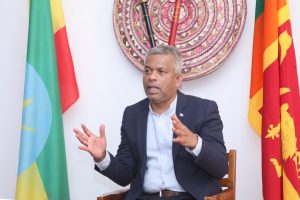
Belete Molla, is Vice Chair and Election Affairs head of National Movement of Amhara (NAMA). He is also staff of Philosophy Department at Addis Ababa University.The Ethiopian Herald discussed range of issues regarding NAMA and the political objective the movement aspires to pursue.
Excerpts: Herald:What makes you conclude that there had been anti-Amhara movement in Ethiopia? And how do you justify it?
Belete: The Anti-Amhara narratives date back to the time of European Colonialism. A generally agreed upon pursuit to declare the supremacy of colonial powers over Africa had only been found incomplete because Ethiopia remained unconquered. While searching the reasons for thatparticularly after the battle of Adwa, it was found out that the patriotism and bravery of the Amhara people was the profound setback. This aspect was heavily researched upon and even formally documented.
Herald: Could you cite some of them?
Belete: “Abyssinia: the Powder Barrel” by Baron Roman Prochaska is a typical document designed as a thematic guideline for colonial action. This document was translated into many languages so as to reach as many colonial ambitions as possible. The crux of this is that in order to realize the fall of Ethiopia prey to colonialism, the history, social fabric and the people of Amhara should be put to assault.
A grand design meant to disrupt and destroy the Amhara people, which was supposed to be a pillar for the country that hoists the flag of Ethiopian independence was launched in the open. Put shortly, depicting the Amhara people as enemy of the other Ethiopian peoples and as having maintained serfdom and domination was openly advocated. Following was dividing the map of the country on ethnic lines to weaken the unity of the country thereby render it prone to surrender. This colonial architecture later found its way in the works and actions of ethno-nationalist movements in the country. Virtually all ethno-nationalist movements accuse Amhara as oppressor. A myth found its way and unveiled itself in different sabotages and destructions.
Herald: Among the regimes you accuse as anti- Amhara is the Derg but what had a totalitarian government to do with ethno-nationalist and as you said it “colonial projects”?
Belete: If there was any positive to be said about the Derg, it is surely a determination to keeping the country’s territorial integrity and perhaps the intolerance for corruption. On the face of it, the Derg also seem to be neutral to ethnic affiliations or ethnic considerations. Yet, that has been found a shallow reading of historical facts.
The tactical discriminations on applying its ruthlessness on Amhara were not a neutral one. The killing of people under the guise of class struggle finally coils back to its systematic and disproportionate killing of Amhara. The ethnic hatred against Amhara by the president and other top ranking officials has started to come to light.
The Derg might claim that, when they killed about 60 high-ranking officials of bygone regime, they were killing reactionaries and counter revolutionaries, but that was only a pretext. Our reading of this phenomenon cannot be otherwise than the killing in mass of prominent Amhara individuals so that to bring Amhara under a withdrawal motivation and make them lose their historical resilience.
I would say this was the tactic played by the Derg which many have not known including our people of Amhara, and to this day. It should also be noted that the nationalization policy of private properties dragged many Amhara into poverty. Clearly Amhara were the most affected with this policy. It should not also be taken lightly that the coming to power of the Derg brought into a downfall of a system of governance which the people of Amhara had maintained for millennia, so a spiritual damage to us.
Herald: Does this mean you want to restore the system?
Belete: This should not imply as if to mean we would like to see the restoration of a monarchical government with an absolute power, but only that we believe the system could have in any case been democratically transformed and be used to play a constitutionally designated role to which we find examples in some countries of the world including Great Britain.
Herald: Wouldn’t you think that your regional stance [based on ethnic identity] may impact on the project of Ethiopian unity?
Belete: By Amhara, we mean the totality with which the becoming and being of the peopleis made manifest to the rest of the world. This, in addition to being Amhara by blood, includes the material and spiritual history of our people that has been accumulating for several millennia, as well as the culture, the sociology, the psychology, the art, the philosophy and anything of the sort called “of Amhara.”
Considering this, we are clear when stating that our forefathers had assumed the lion’s share not just in forming the Ethiopian State but also in defending its sovereignty which every sane Ethiopian cannot deny. So, for people who put such a heavy print on the coming into being of Ethiopia, and people who maintain active memory of the long yesterdays, it wasinevitable that we would proudly identify with the Ethiopian identity, if this might be what you perceived as a “transition from Amhara identity to Ethiopian identity.”But, because this is only true of a great people who built a civilization with remarkable distinction, it should not amount to saying that Amhara as a people had thereforein the process renounced their organic identity and become only-Ethiopians.
That is, in the process of forming the Ethiopian state, sure we had become more Ethiopians than Amhara, as we gave to our Amhara identity a narrower chance for expression and pronouncement. But as I said above this is a challenge only great peoples (nation builders) face. Perhaps this has cost us dearly in the face of a political experiment whose organizing norm is based on ethnicity – an experiment that has been operational for the last quarter century or so. We now know that being more Ethiopian and less Amhara played only to our demise while the majority of other Ethiopian peoples are conscious primarily of their ethnicity and organize along that line. In a nutshell, it could be said there was a political transition from Amhara to Ethiopian identity. But once again that was just political.
Yet, reaffirming Amhara identity thereby politicking when the national one fails to deliver fairness, equality, proper regard and representation is a testimony for the resilience of Amhara identity. The transition to Ethiopian identity politics is not a wrong in itself. However, when other nationalities have historically mobilized along ethnic lines and the nationality question has become an organizing principle, there is no cogent point for Amhara to stand alone as mere Ethiopian.
The problem is exacerbated particularly because other nationalities and of course many national mobilizations are directly or indirectly based on antiAmhara narratives. Also, if the Ethiopian unity has ever been challenged, it is not just today and never with the coming into the nationalist mobilization of Amhara. We believe that a strong Amhara organization can only help strengthen Ethiopian unity, while pushing Amhara to the fringe has proved to only weaken the country.
Herald:Does anybody who claims as your program seem in contradiction with architects of Modern Ethiopia— from Emperor Twodros II to the last King of the Solomonic Dynasty, Emperor Haileselassie’s—makes mistake?
Belete: I don’t think there are any basic contradictions. In fact contradiction occurs only if we assume the existence of similar historical settings during their time and ours. Only an assumption of the existence of similar historical settings would let someone to make such an unfitting analogy. Basically, the present Amhara nationalism does not mark a divorce from Ethiopian identity or sovereignty.
It rather is in line with the ideals propounded by our forefathers. It even advocates a clear embracing of those models. The only apparent divergence is seen from the perspectives that on- lookers have adopted. We have just pursued Amhara nationalism with the view to attain cogent, fair and just Ethiopianism. Hence, ours is only a procedural move to reclaim a disciplined and bargained outcome which is Ethiopia fair and repetitive for all.
Moreover, there is a further presupposition behind the question; that is, a presumption or an attempt to equate the traditional monarchical system with that of an Amhara nationalism, which by the way was the basis for various Ethnic based associations to organize in an attempt to attack and destroy whatever and whoever is Amhara. Loud and clear, we are proud of the national aspirations as well as accomplishments of our forefathers, what they did in their time is remarkable, even sometimes flawless. But we also do not miss the fact that we are now in a different political culture, different in many respects, and cannot be naïve to just work for restoration of a project after the model of the said kings.
The Amhara identity, as a fundamental horizon, has not gotten deserved expression and pronouncement which was among the reasons playing into the horrendous experiences we have come along. We now call ourselves Amhara, first and foremost; we are mobilizing to reaffirm our Amhara identity and redefine an Amhara horizon. But, it doesn’t mean that we will remain bound only to this horizon and be like a windowless monad that will shut itself up against dialogue with others. We are open and will remain so for a cultured dialogue and bargaining, so that, through this effort a new Ethiopia will be pioneered, and sure to the advantage of all.
Herald: Conflicts around areas that separate states (borders) are among the major challenges facing the country…do you think the conflicts have something to do with the federal system?
Belete: The federal system was flawed from the very beginning. Hence, it has become a major reason for border area conflicts. Theoretically, pre-existing federal units would come to a dialogical fusion and form a federation. But in our case, the units were non-existent beforehand and were literally created by [masterminds of EPRDF].
Before the coming into being of the Constitution, [these people] had amassed as much land as it could and finally arranged the stage only for federalism which is in their favor. Neither in the process of this, nor in every stage of the process of creating what is called the FDRE constitution, Amhara people was literally left out of the activity, hence for the masterminds ofEPRDF to freely grab a bigger chunk of Amhara historical lands. Not just this, Amhara lands which then masterminds could not directly annex because of geographical remoteness, were to be transferred to other regional states.
Even worse, lands have also been either transferred or sold to the Sudan, as was made public; this has been one of the reasons for recent political feud between state rulers of bothsides. The fact is actually one of the crucial problems that inspired Amhara nationalism, and perhaps a reason for us to pronounce the struggle as one against existential threat posed on our people by the masterminds. Loud and clear, the Ethiopian constitution and the federal idea are basically a replica of the manifesto the said clique crafted while in guerrilla. And, condemnation, marginalization and disruption of Amhara were the guiding policy principles.
The constitution was a categorically manipulated tool for minority strategy. Federalism would be a better organizing principle for the state. But the guiding and ever-lingering policy was to render Amhara out of the ambit of national politics. The Ethiopian federalism in theory and operational reality was flawed. The democratic deficit in governance was one problem inimical to the system but it was generally incidental.
Conflicts abound in the main land. There are conflicts at boundaries between states. The irresponsibility of the state in denigrating political and social equality, rule of law, due process, economic fairness, etc. is one gross failure.
Herald: What you put it as ‘discourse/historico-political narrative and construction’ says that change in regime may also impact on what we may call Ethiopian Identity? What sort of Ethiopian identity would your program bring about?
Belete: Here is one thing which we must be honest at and courageously accept, though it may understandably be a tough call for Amhara. That is, what is called the Ethiopian identity, or the being of Ethiopia, is not something that is given for once and for all, or for the longevity of eternity. Bitter or not, the Ethiopian identity is a historico-political facticity, so a construct, and ontologically speaking, less essential than say the Amhara identity. We are born individuals first, hence individuation is ontologically so fundamental an identity which we can’t deny.
However, the fact that we are also born into a family which is itself a part of a culture, a philosophy, a history, a tradition, a language, a psyche, etc, means that we cannot remain in solitude for life as we also belong to a society whose pains and pleasure we share. So, this is evidence that we are also beings infinitude and have a politicohistorical identity; we are humans, we make history, we are subjects of history, we build a culture, we engage in discourse, and this inevitably brings about a bigger identity, in our case, the Ethiopian identity which at one time in the remote past could not be perceived as existing until the efficient causes who are responsible to its formation come and do what they did – our forefathers.
Our program wouldn’t be naïve to claim to build an Ethiopian identity more fundamental than the historical identities by which we make sense of people as belonging to their own respective existential finitude. We don’t want to do this against what nature installs, we are doing politics but we would also like to go according to nature so that means respecting the identity of all Ethiopian ethnicities as essential and indissoluble, including our own Amhara identity. Yet, we also believe that the Ethiopian identity could be created more vital, more beautiful, and more robust through genuine dialogical encounters among all the peoples of Ethiopia. We do not lose hope and optimism that we can make Ethiopia beautiful again.
Herald: You seem to take lesson from the struggle of Kurdistan, do you see any correlation to your struggle?But they have not championed in gaining Independant state Plus, if you emulate lessons from that, does that mean you have plan of independence?
Belete: Well, the Kurdistan are people who are big in number, about 30 million, but otherwise stateless. They are actually called the biggest stateless people in the world. They are found scattered in several countries in the Middle East including Iran, Iraq, Turkey, and Syria. If we take lesson from the Kurdistan, it is definitely not from their struggle, but from their failure as a people, from their history.
They are stateless means that their struggle so far is not one to be inspired at. As Amhara we can take lesson from the historical experiences that made the Kurdistan stateless. Why had the Kurdistan been made stateless from the beginning? This is probably the important problem we need to be clear at and perhaps take a lesson from.
The Kurdistan had made different national movements in different centuries, but all this for no avail. The first modern Kurd nationalist movement was made in 1880 led by Sheik Ubeydullah, but this was only to be defeated. Why? The reason, as we evaluated it, was due to the absence of a sufficiently strong pre-existing Kurd nationalist consciousness that was ready to shoulder the movement.
This unfortunate case can be likened with the Amhara movement pioneered by the martyr Prof. Asrat Woldeyes. He inspired an all-Amhara nationalist movement yet that was only to crumble for the majority of the people of Amhara were not upto the call by the martyr. Had there been a sufficiently strong pre-existing Amhara consciousness by the time, Prof. Asrat rang the bell for Amhara to organize, a lot of damage could have been minimized both against Amhara as a people and Ethiopia as a country. This is what happened to the Kurd in most of the time when their elites had come to initiate a movement for the liberation of their people.
For example, following the end of the First World War when the Ottoman Empire came to disintegration, and when numerous countries began emerging as independent from the ashes of Ottoman Empire, Kurd could not. And this is because the Kurd nationalist movement could not be strong enough to battle it out and emerge as an independent state. So, the lesson is clear. For Amhara to deflect every threat that has been posed against us by policy, threats that we clearly face now, and threats to come from whatever direction in the possible future, we need to organize, but this organizing should come along with a strong Amhara consciousness which we are actually pioneering now. We are now in a much better position than at any time in the last 50 years or so.
Herald January 4/2019




